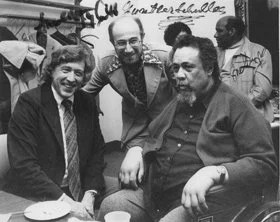Celebrating Gunther Schuller's Centennial
Sue Mingus and Gunther Schuller at St. Bartholomew's Church, NYC, February 2011. Photo by Shannon Manning (Jazz Workshop Inc. Archives)
“I met [Mingus] through John Lewis, the pianist with the Modern Jazz [Quartet]. The three of us would sit for hours in the Carnegie Hall Tavern and talk about solving all the problems of the world. I eventually got to know more of his compositions and became an admirer of his works. I commissioned Mingus to compose a work for a concert that Brandeis University asked me to organize. This was an historic concert, where three classical composers’ (Milton Babbitt, Harold Shapiro and I) and three jazz composers’ (Mingus, George Russell, and Jimmy Giuffre) works were featured.”
Celebrating the centennial of Gunther Schuller, born November 22, 1925, with a clip from the 1997 documentary Triumph of the Underdog. Schuller is seen here conducting and discussing the premiere performance of Charles Mingus’ magnum opus composition Epitaph, a 19-movement, 2 ½-hour work scored for 31 musicians, not fully performed until 1989, ten years after the composer’s death.
Schuller was an early and enduring champion of Mingus Music, attesting that he first heard Mingus’ standout work as a bassist and composer in 1947 with Lionel Hampton’s band. Schuller later became a friend and collaborator, conducting compositions such as “Half-Mast Inhibition” (Pre-Bird, Mercury Records, 1960) and “Revelations” at the aforementioned Brandeis Festival of the Arts in 1957 (reprised the same year at a recording session for Columbia Records), and again with the New York Philharmonic in 1978 after Mingus became disabled from ALS.
After Mingus’ passing, Schuller was a vital part of the gargantuan effort to reconstruct and finally premiere Epitaph in full, subsequently touring the piece throughout the world in the 1990s and 2000s. He also lent his support as an arranger and sometimes-conductor for Mingus Big Band and Mingus Orchestra. As an experienced educator, he helped guide the next generation of upcoming musicians studying Mingus through his recurring participation in the annual Charles Mingus Festival and High School Competition from 2009 onward.
Gunther Schuller, Arnold Jay Smith, Charles Mingus, prob. April 29, 1978 at New York Philharmonic performance Prospective Encounters (featured “Revelations,” comp. Mingus, cond. Schuller), Cooper Union, NYC. (photographer: Vaughan Publer, Atlantic Records, image sourced from NewMusicUSA.org)
“Above all, in his extraordinary — both historic and stylistic/linguistic — breadth, Mingus stands alone. And, if that weren’t enough, as a composer, Mingus is not only a chronicler of the musical history of jazz — and even to some extent of modern classical music — but also a story teller, a narrator, a philosopher, a poet, a lover, a socio-political activist, and commentator. His multifaceted music reflects and embodies both the beauty and honesty, as well as the turmoil, of his life.”

